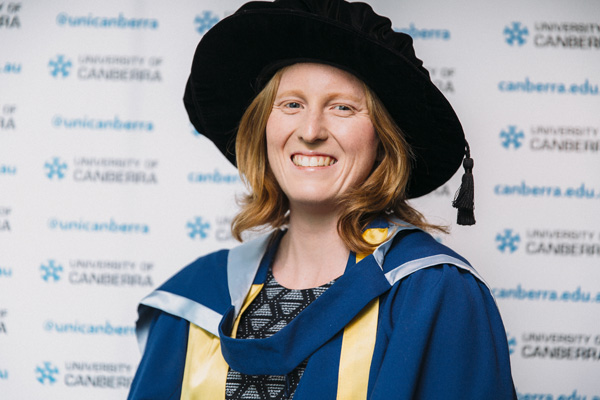Amanda Jones
19 October 2016: Taking inspiration from track cyclists using heated tracksuit pants before a race and a passion for swimming has led to a Doctor of Philosophy for University of Canberra’s Courtney McGowan.
After seeing the Australian and British track cycling teams use heated tracksuit pants to keep warm in the period between the warm-up and a race otherwise known as the transition phase, Dr McGowan and her supervisors were interested to see if they could transfer the technique to the pool.
“Track cyclists only have to deal with a 10 to 15 minute transition phase,” she explained. “Swimmers on the other hand, have to deal with a longer transition phase (20-45 minutes) including the time it takes to get changed into their race suits and a marshalling period where they are not allowed to complete any additional active warm-up exercises.”
“Body temperature, in particular core and muscle temperature, begins to decline immediately after exercise which is a big issue considering one of the key benefits of completing a pre-event warm-up is to warm-up the body,” Dr McGowan, whose mother competed for Australia at the Commonwealth Games and was a founding member of the AIS swim team, said.
Her research included five studies which examined the effectiveness of using heated jackets and dryland-based exercises in the final preparation phase in competitive swimming.
“For both the junior and senior swimmers [including members of the current Australian swim team] we found that wearing heated tracksuit jackets and completing a short dryland-based exercise routine better maintained core temperature during the transition phase which resulted in faster start and overall performance times,” she said.
She also examined whether completing a bout of morning exercise can improve a swimmer’s performance later that day.
“At the Olympics and World Championships, coaches of swimmers qualifying for the final in the 50, 100 and 200m events are faced with the question of whether to complete a morning swim or some form of dryland-based exercise prior to racing that evening or to simply rest.
“We found that swimmers who completed a morning swim session or a swim session followed by dryland exercise circuit performed better in their afternoon swim than those who did not complete any morning exercise.”
Dr McGowan counts working with members of the Australian swim team and being named the ACT’s Best New Investigator by Sports Medicine Australia in 2015 among the highlights of her study.
“Participating in the University’s Pitch for Funds and 3MT competitions was also very rewarding, not only because I won funds for my research but also because I learnt how to present my research to the general public and met other research students,” she said.
Dr McGowan is now working as a strength and conditioning coach with a private company in Brisbane and teaching at TAFE Queensland.
She dedicated her thesis to her mentors the late Forbes Carlile and his wife Ursula Carlile.
“Forbes and Ursula were the catalysts that helped drive swimming in Australia to be the pinnacle Olympic sport. They were true pioneers of applied swimming research.”
Read about more of our recent graduates:
Dame Quentin delighted by UC award
Exchanges add to UC degree for Stella
Politics inspires PhD for 3MT winner
Stephen graduates with double degree



